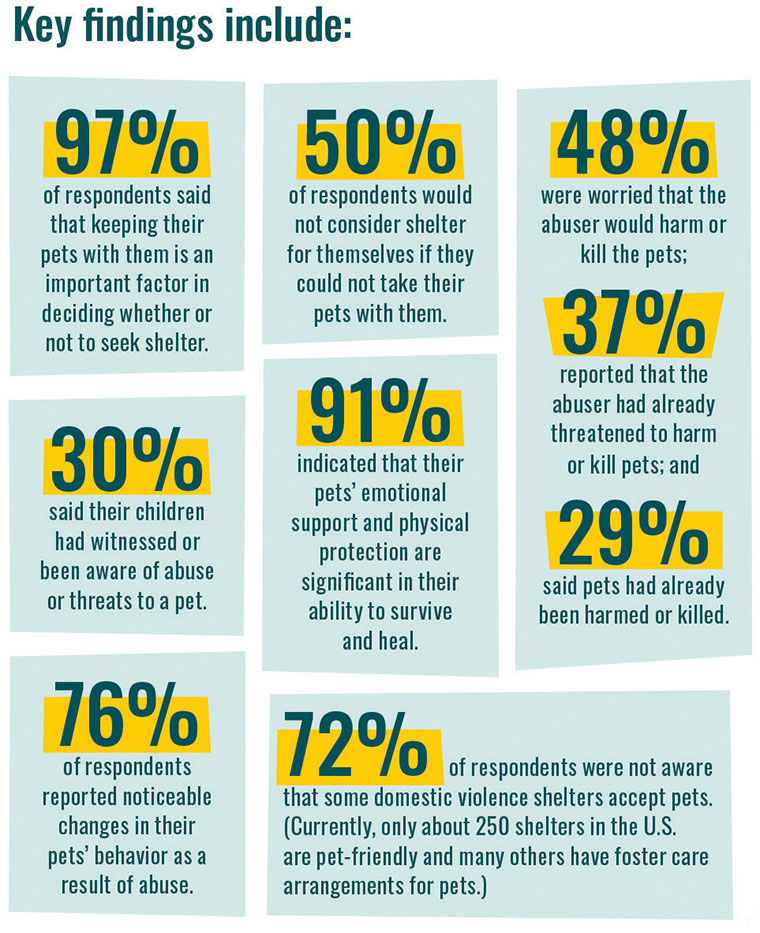
November 01, 2021
Report shows need for more pet-friendly domestic violence shelters
A new report’s findings indicate that fear for the welfare of pets is a barrier that keeps domestic violence survivors from leaving abusive situations. In addition, a relatively new federal grant program that provides funding to support shelter and transitional housing services for domestic violence survivors and their pets awarded funding to six organizations last year and will announce the 2021 recipients later this year.
Ninety-seven percent of domestic violence survivors report that keeping their pets is an important factor in deciding to seek shelter, according to the “PALS Report and Survey: Breaking Barriers to Safety and Healing” (PDF) released this past May as part of the People and Animals Living Safely program of the Urban Resource Institute, a provider of domestic violence shelter services.
The Urban Resource Institute partnered with the National Domestic Violence Hotline to conduct the largest nationwide survey of domestic violence survivors focused on the impact of pets on survivors’ ability to leave a dangerous situation.

Half of the respondents wouldn’t consider seeking shelter for themselves without their pet. Yet, only 3% of domestic violence shelters in the U.S., or about 250 shelters, provide co-living options for survivors and their pets, according to the report.
Additionally, 48% of domestic violence survivors were worried that the abuser would harm or kill the pets; 37% reported that the abuser had already threatened to harm or kill pets; and 29% said pets had already been harmed or killed. And 76% of respondents reported noticeable changes in their pets’ behavior as a result of abuse.
The new federal Emergency Transitional Pet Shelter Housing and Assistance Grant Program is a part of the Pet and Women Safety Act that was included in the 2018 Farm Bill.
Zoe Agnew-Svoboda, director of pet advocacy at Rose Brooks Center, a domestic violence emergency shelter in Kansas City, Missouri, and one of the 2020 grant recipients, said the shelter was already offering pet services but was able to expand the program with the new funding.
“With this funding, we were able to expand the number of pets we can house in our shelter,” Agnew-Svoboda said. “We also started providing outreach services such as boarding for survivors’ pets when they are fleeing but do not have access to shelter, financial assistance for veterinary services, and financial assistance for housing relocation for survivors with pets.”
The other awardees for 2020 are the following:
- The Arizona Coalition To End Sexual and Domestic Violence in Phoenix.
- Delaware Tribe of Indians in Bartlesville, Oklahoma.
- Unity House of Troy in Troy, New York.
- The Safe Alliance in Austin, Texas.
- The YWCA Nashville Domestic Violence Pet Shelter.
The deadline to apply for 2021 ended in June, and new awardees of $2.5 million in funding will be announced in November.
The PAWS Act Coalition, a group of organizations working to raise awareness about the grant program, consists of Nestle Purina PetCare, the Human Animal Bond Research Institute, Noah’s Animal House, Pet Partners, the Urban Resource Institute, and RedRover.
Nicole Forsythe, president and CEO of RedRover, said the organization is thrilled to be a part of the coalition. RedRover helps domestic violence survivors seeking safety with their pets, among other programs.
“Funding is desperately needed to help more domestic violence shelters build pet-friendly spaces onsite,” Forsythe said in a press release. “Pets are often used as a manipulative tool by an abuser, and victims fear leaving if they can’t take their pets with them. Creating pet-friendly spaces at shelters is the solution to saving more lives.”